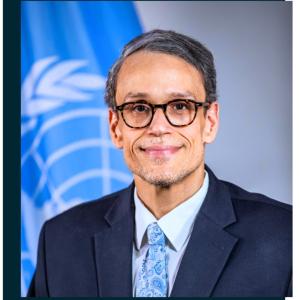Chairperson of the Gambia Press Union
Members of the Gambia Press Union
Chairperson National Human Rights Commission, Mr Emmanuel Joof
All partners present
My fellow UN Colleagues
All protocols duly and respectfully observed.
Ladies and Gentlemen,
It is a pleasure to be here today as you embark on this critical capacity building exercise aimed at equipping media practitioners with knowledge and skills on how to identify, address and monitor hate speech. Journalists are crucial to information dissemination; however we live in a time where certain individuals leverage on opportunities created by new media to spread hate, divisive and unfound messages.
The Gambia has, through national and international human rights law and principles, committed to ensuring the protection of freedom of expression, equality and combatting discrimination. It also has an obligation to take strong action against hate speech and to prohibit advocacy of any type of hatred or speech that constitutes incitement to discrimination, hostility or violence However, every right enjoyed comes with a certain level of responsibility and you are key to ensuring hateful messages do not make it across your platforms.
Every segment of the Gambian society has a role to play in the fight against hate speech and the media plays a pivotal role as you disseminate information to the public and raise awareness on essential issues affecting our communities in all fronts.
Ladies and Gentlemen,
The Gambia is approaching elections.
Campaigning is intensifying, political tensions are high, and we are observing an increase in distasteful language including insults, hate speech and bullying in different fora including mainstream media, online media and social media platforms.
I applaud the Gambia Press Union for recognizing this and taking necessary steps by organizing this initiative that contributes towards peaceful elections by ensuring journalists understand how to tackle hate speech in their coverage of the elections and coverage of other issues after the election period.
The media occupies key positions and are expected to be drivers of positive change in the society. It is indeed a delicate balance between protecting freedom of expression, whilst addressing hate speech, however, I trust that this training will build your capacity to effectively engage your communities in line with relevant professional ethics and human rights standards.
I also applaud the GPU for ensuring that media from other regions are beneficiaries of this training. It is essential that remote communities are constantly informed and included in affairs of the country to ensure no one is left behind. This is particularly important as the media landscape continues to grow with the evolution of more community radios and online media platforms from across the country.
The media has an important role to play in holding political leaders accountable for the commitments made against instigating hate speech and violence during the elections. Some of the instruments the leaders have committed to, by appending their signatures, include the IEC Code on Election Campaign Ethics, IPC MoU and Code of Conduct, the Janjanbureh Peace Accord and Code of Conduct by Presidential candidates.
I acknowledge the presence of the National Human Rights Commission, a staunch partner in the promotion and protection of human rights in the Gambia. I commend and thank them for their support, contribution and tireless effort in ensuring a culture of respect for human rights in The Gambia.
Ladies and Gentlemen,
I take this opportunity to inform you of the United Nations’ Strategy and Plan of Action on Hate Speech that was launched in 2019. The UN system in The Gambia is committed to contributing towards the eradication of hate speech.
We acknowledge the role of the media in disseminating information to the public and their role in influencing public opinion and will therefore continue to engage and convene relevant actors including new and traditional media.
I congratulate the GPU on this initiative and reiterate our continued partnership and support.
I also want to thank the UN Office of The High Commissioner for Human Rights (OHCHR), the United Nations Development Fund (UNDP), the United Nations Office for West Africa and the Sahel (UNOWAS), the United Nations Office on Genocide Prevention and the Responsibility to Protect, the National Democratic Institute (NDI) and staff from my office who have contributed substantive and financial support.
I wish you all successful deliberations and want to take this opportunity to share the knowledge learned with other colleagues who are not fortunate to benefit from this training. Spread the word, spread messages of peace and always be cautious of the type of messages you publish or always share on your platform.
I thank you for your kind attention.




